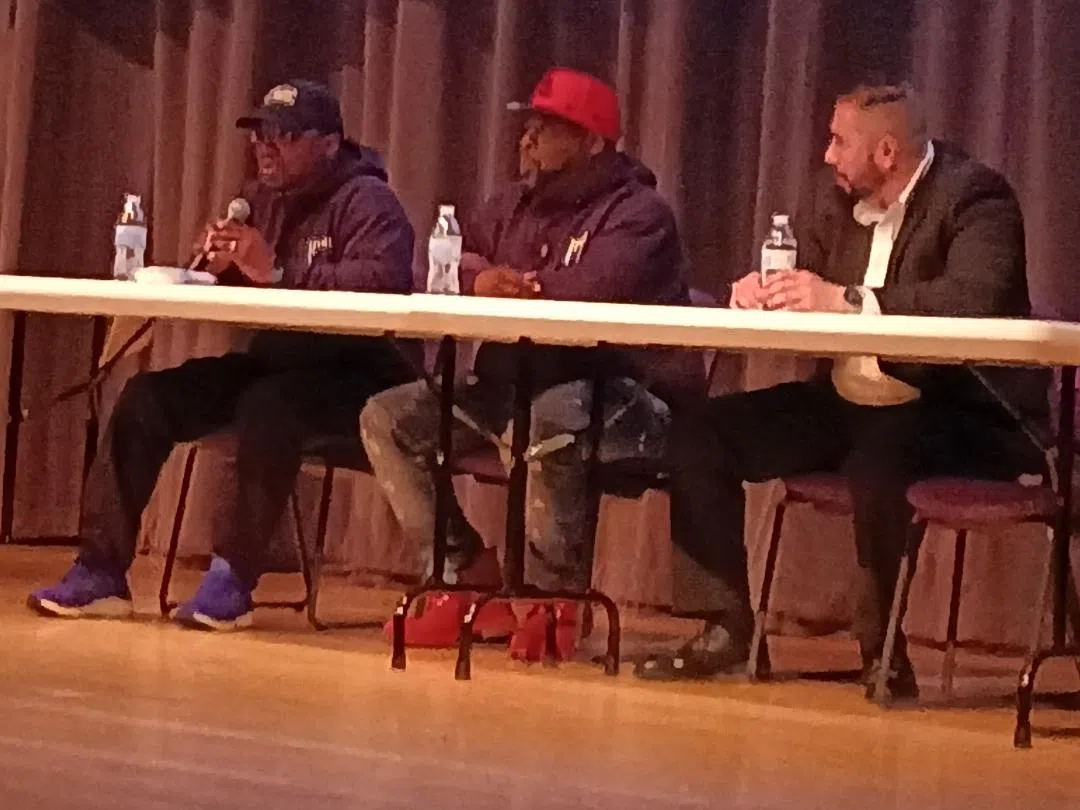The President of Phi Theta Kappa international honor society at Heartland Community College during the society’s symposium said she wants to change the narrative on incarceration.
Wright emphasized, “We really want to get rid of the stigma of what incarceration means to other people. You think about incarcerated individuals, and you think, oh they must have done something really bad, or they can’t change, there’s no reform, etc. When in reality that’s not how it is.”
“The narrative that is out there is people that are incarcerated or have been incarcerated are bad individuals,” said Wright. “Sometimes that’s true. But you have to look at what has happened in their life to cause some of these things to happen.”
Wright would like to see the narrative changed to “Situations happen. People make mistakes. People do things that are not necessarily good. But people want to change.” “Nobody wants to sit in prison for their whole life, Wright said. “We want to reform and we want to provide resources for these people that are coming out to change their lives.”
Renaldo Hudson served 37 years of incarceration (13 years on death row and 17 years serving life without the possibility of parole) before he was granted executive clemency.
What was Hudson’s “mistake?” What was his “not necessarily good?”
Hudson brutally murdered his neighbor.
“As the victim lay on his bed bleeding, defendant asked him for money. The victim gave him four single blood-soaked dollar bills. Defendant asked for more money, and the victim told him to look in a gold jewelry box on the dresser,” states court documents. “After defendant was unable to locate the jewelry box, the victim tried to get up to show it to him; however, he was bleeding too profusely to move by that time. Nonetheless, the victim continually told defendant to take anything he had, as he pleaded with him not to kill him. Finally, Hudson turned on the television and sat down on the bed next to the victim as he watched him die.”
Now he works for the Illinois Prison Project, after being incarcerated, where he speaks in classrooms and convention halls, meets with lawmakers, community organizers, and faith leaders, and shares his experiences with poverty, trauma, incarceration, and redemption. Hudson spoke at the symposium.
“The heart of our message is please pay attention to the dangerous one-sided narrative, which deals with the hard things that tends to push people away from people, from being empathetic,” Hudson said. “I want to wake people up to the importance of caring about those that fall and do really bad things. How do we heal our society if we don’t make room for the least of them?”
“Don’t judge a book by its cover.” said Hudson. “If you read about my past you can’t see the potential that I possess today. Often times what happens is an act is judged and made to be the person. I am responsible for the act. I am not the act. And that is essential.”
NaJei Webster served 8 years of a 21 year sentence. Najei Webster was found guilty of home invasion and armed robbery.
“I wasn’t a bad kid,” said Webster. “I didn’t grow up in a bad neighborhood. I just met the wrong guy. So throwing me in a prison where I wasn’t abused growing up or I didn’t go through many traumatic things and then throwing me in a prison where it’s just happening all around, that’s like trauma in itself. I don’t think they take into consideration how traumatized people are or what people have been through before they just throw them in there and it’s like you did the crime go do the time. And it don’t matter how its going to mess you up.”
“And then it’s like you don’t give me help to deal with the trauma,” said Webster. “You just sit me in a cell and hope that I can figure it out and then send me outside with no resources. “So how do I really rehabilitate myself?” She asked although she works for Restore Justice now.
Angel Pantoja is a Prisoner Coordinator for Illinois Coalition for Higher Education in Prison Pantoja spoke on a panel regarding how imprisonment becomes perpetual punishment after the incarcerated person is released.
“What sort of takes everybody by surprise is once the judge sentences us, I think everybody is under the impression that I will go serve my time inside the department of corrections and once I am released I will no longer be punished or restricted or some may even say disabled in some sense,” Pantoja said.
Pantoja continued, “I used the example earlier of a buddy of mine that was trying to be the executor for his father’s will. And they told him flat out no you can’t do that because you have got a felony conviction. So anytime a felony conviction prohibits us from engaging in something that everybody else has a right to, that is a perpetual punishment.”
Pantoja shared a story regarding an observation his girlfriend made. Because he has been incarcerated he has many friends that have been incarcerated. His girlfriend noted that even though they were grown men, 40 years old, they were 40 year old boys. The reflection captured the behavior of Pantoja and his friends. Because they had been imprisoned young and everything had been provided for them in prison they had missed out, not only on formal education, but also real life experiences that enable people to mature.
Pantoja related another story to make the point. He and a friend were out and his friend happened to get injured with a head wound that was bleeding. His friend’s first thought was we have to get somebody that can help us to tell us what to do. Pantoja realized, we are adults we should know what to do. But they didn’t, because they hadn’t faced real life experiences outside of prison.
The Bloomington Police Department participated in the symposium with a table outside the auditorium. Sergeant Kiel Nowers said, “I am the head of the Community Engagement Unit and one of the primary focuses for that unit has been trying to reach out to people who have either had a bad relationship with law enforcement or no relationship and to try to build up trust in the community so that they know that if they have a problem or any concerns or issues that they can come to the police department and we will treat them with dignity and respect.”
“And obviously one of those groups that feels left behind or does not feel comfortable dealing with the police is people who have been previously incarcerated,” Nowers stated.





